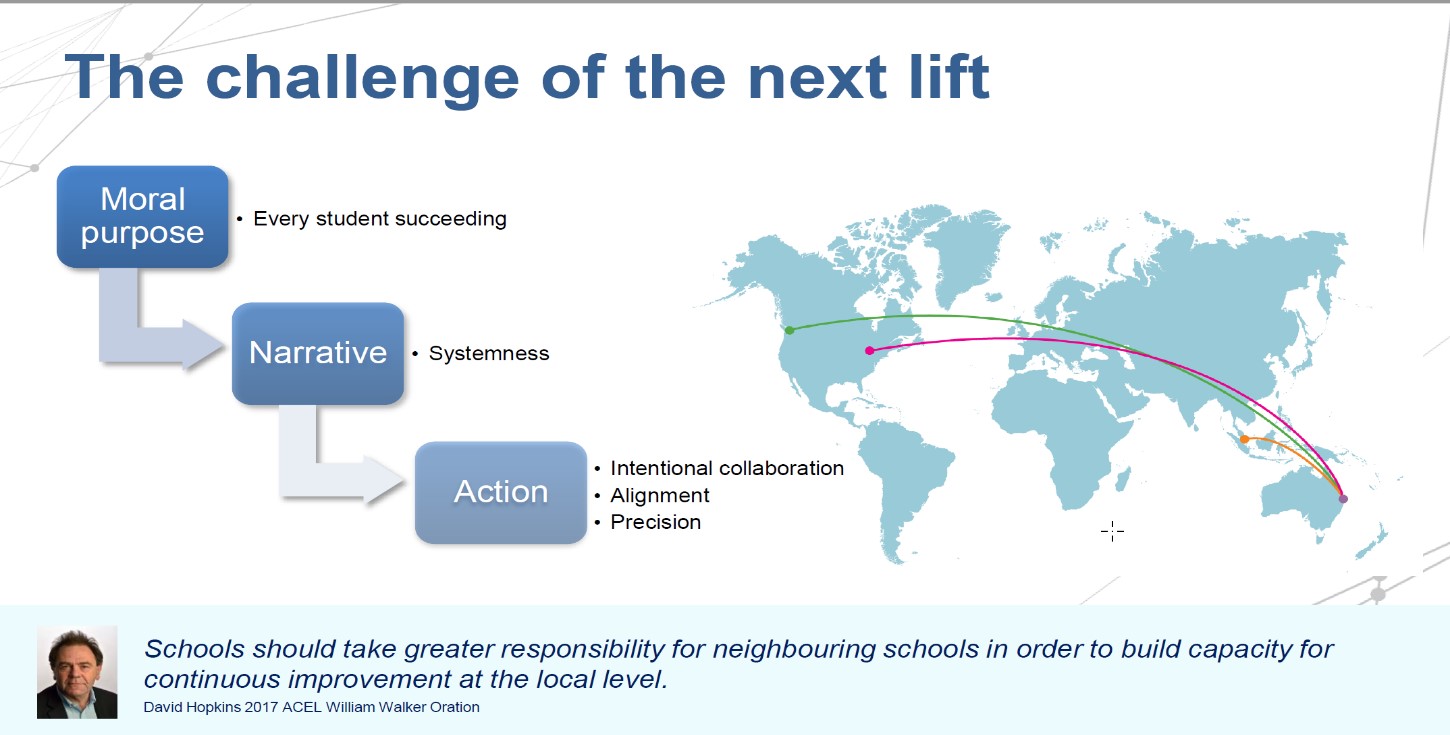In the ENABLE, coalition of schools we work together in different layers of intentional collaboration in a variety of networks to pursue quality outcomes for staff, students the community and many other stakeholders.
Our mission is to lead education and community growth in our region, through strategic influence and advocacy around learning, resourcing and leadership with students, staff and our community and this is linked to our State Schooling Strategy - 'Every student succeeding' – by Precision, Purpose, Connectedness and Team Work across our network and region
Our work is based around the work by Michael Fullen (2019) - "If you want good ideas look sideways. Our future is lateral not hierarchical. It is time for an evolutionary correction" and Andy Hargraves (2018) – "If your school is doing well and you want to know what to do next… intentionally collaborate with another school".

![]()
ENABLE layers of Intentional Collaboration are across a wide range of professional networks in our fourteen state high schools in our region:
Principals Network
The ENABLE Principals are the driving strategists that steer the course of the coalition. Motivated by a strong professional development and strategic planning agenda, all 14 ENABLE school leaders formally convene four times a year. Through their collaborative efforts, ENABLE school leaders have been making their mark on the region's educational landscape in a range of different target portfolio areas. The partnership has also empowered our principals to source and command the highest quality of professional development opportunities that are available in the industry.
Deputy Principals Network
Central to ENABLE's journey has been the enrichment and support of a strong Deputy Principals' Network. In recent years, the professional learning conversations and united vision building of ENABLE Deputy Principals has facilitated a shift in the traditional perception of the deputy principal's role, from one of an operational manager to the recognition as a key strategic leader. Our Deputy Principals Network is divided in three Portfolios that meet once a term in the following areas:
- Senior schooling
- Junior schooling
- Policy and schooling
The chairs of the three Networks then collaborate with the regional deputy principals who lead their schools in these areas. Core initiatives of the ENABLE Deputy Principals' network include, regular meetings to work on regional systemic agendas, high quality professional development, sharing of best practice, peer mentoring and coaching and expansion of community and professional partnerships.
Heads of Department & Curriculum Networks
The Heads of Department, Curriculum Leaders and members of school middle management teams form the backbone of ENABLE's professional learning community.
Currently, networks for middle managers in ENABLE schools span across more than 20 different Curriculum and Non-Curriculum support areas. These networks have a strong focus on leadership capacity building, the ongoing renewal and reinvigoration of curriculum programs, the sharing of best practices and the formation of regional and joint initiatives in the form of small and large scale, projects that improve the outcomes for our students across the network of schools.
Through targeted, ongoing professional development, ENABLE is also able to empower school improvement strategies through supporting and nurturing middle managers in their role as facilitators of the regional reform agenda.
Our current Heads of Department and Curriculum Networks are divided into Curriculum areas and Non-Curriculum areas. Each Networks has a chair and a co-chair who liaise with colleagues and convene meetings in their portfolio area across the region once a term:
Curriculum Areas - Design Technologies
- Digital Technologies
- English
- Health & Physical Education
- Home Economics
- Humanities & Social Sciences
- Mathematics
- Junior Science
- STEM
- The Arts
- Business
- Chemistry
- Biology
- Psychology
- Physics
| Non-Curriculum Areas - Head of Special Education Services - HOSES
- Junior Secondary
- Senior Secondary & VET
- Library
- IT Support - Technical Officers
- Mentoring Beginning Teachers
- Industry Liaison Officers – ILO's
|
Teachers & Support Staff
Our teachers and support staff ENABLE tomorrow. ENABLE schools recognise that teacher quality and effectiveness are paramount in influencing student achievement. ENABLE seeks to support, enrich and celebrate our teachers and support staff through the following platforms:
- Teacher networks: ENABLE schools encourage our educators to move away from the traditional view of teachers as isolated practitioners but rather accept the role as a participant in a collaborative, learning-centred journey. ENABLE facilitates several teacher driven curriculum networks that empower our members to tackle initiatives, take risks, accept leadership responsibilities and feel confident as professionals through collaborative projects and sharing of best practices.
- Recognition Awards: There is compelling research evidence to suggest that teacher recognition is linked to improved performance and better student outcomes. ENABLE Awards recognise, honour and celebrate the outstanding work of staff members in our schools.
- Professional development network: Aligned to priorities stipulated by a shared performance framework, ENABLE is responsible for coordinating a range of professional learning and professional development opportunities, in consultation with region to speed necessary reforms and agendas and further enhance teacher expertise in key areas.
- ENABLE has also made a commitment and has a dedicated approach to supporting and building the capacity of our support services teams.